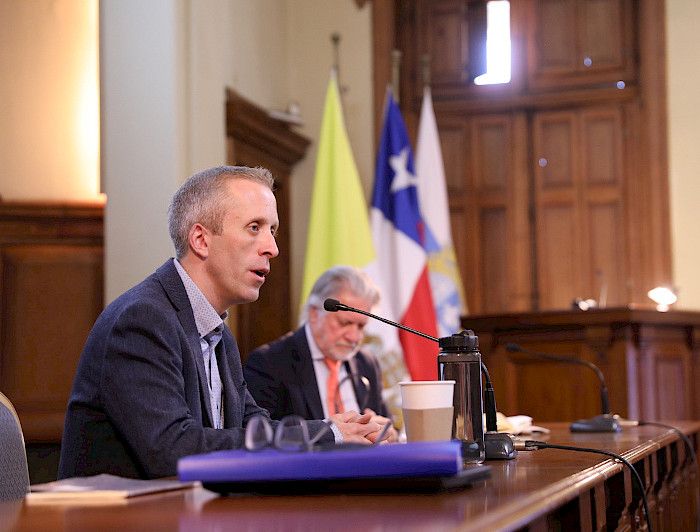Chile (Pontifical Catholic University of Chile) The “Ethics of the war” was the focus of the international conference of the Applied Ethics Institute

Specialists James Pattison and Helen Frowe reflected on the ethical implications of armed conflicts and the behavior of those who lead them.
The meeting, organized by the Institute of Applied Ethics of the Pontificia Universidad Católica de Chile with the Center for International Studies (CEIUC) and the Institute of Political Science , was held under the title “Ethics of war” and was attended by leading international specialists in ethics in the context of war, Professors James Pattison (University of Manchester, England) and Helen Frowe (Stockholm University, Sweden). In their respective papers “On the alternatives to war” and “Heritage protection in the context of war”, the academics presented criteria for evaluating and reflecting on the behavior of countries at war and those who lead them.
In his presentation, Professor Pattison referred to the advent of a post-liberal order that would have the effect of further weakening the main alternatives to war as they would depend on the limited influence that a limited set of rules could exert. In turn, the fact of having to look for alternative options to armed conflicts would acquire more relevance due to the even greater problems that the ethical regulation of wars would have to face. In this sense, the academic concluded, the post-liberal order would promote a broader perspective in the search for alternatives to war, which would not only have to consider new measures but also other objectives. Under this perspective, Pattison argued that there is an even greater duty to seek options to war.
Professor Pattison emphasized that “we should not go to war under any circumstances, but adopt alternative measures beyond economic ones, such as diplomacy. Avoiding war implies being able to use these economic resources in other areas, such as education, health and climate change.
For her part, Professor Frowe evoked in her presentation the 1954 Hague Convention on the Protection of Cultural Property in Time of Armed Conflict, which obliges States to take measures to protect their own heritage sites and objects, to protect heritage in occupied territory and limit the use and damage of heritage sites by its combatants. The academic referred to the difficulties that these obligations pose when determining the value of heritage and, in particular, to balance that value with the risks for people. In this sense, she argued that taking heritage protection seriously suggests that it is morally inadmissible for States to adhere to the Hague Convention, because it imposes unjustified risks on combatants.
“Combatants should know before enlisting that they will also need to protect property and be aware that they could risk life or serious injury to do so. Today, even though there is a contract that links them to institutions of the Armed Forces, without express consent they are not morally obligated to assume these risks,” said the academic.
The conference, which was held in the Hall of Honor of Casa Central, included the participation of the rector Ignacio Sánchez, as well as the director of the Institute of Political Science (ICP) UC and co-organizer, Umut Aydin; the director of the Center for International Studies UC (CEIUC), Jorge Sahd; the director of the Institute of Applied Ethics UC, Juan Larraín; the former diplomat and associate member of the CEIUC, Pablo Cabrera, as well as students, teachers and members of the Armed Forces.
interdisciplinary dialogues
The activity also included two days of dialogue, in which specialists from various disciplines from the Catholic University met, generating a fluid conversation about ethics and war among the attendees.. Professors linked to the study of international relations participated in the instances, such as Professor Nicole Jenne, from the Institute of Political Science UC. Her presentation was moderated by Professor Stefano Palestini, from the same Institute, who, from comparative regionalism, commented on the presentation. From an applied ethics perspective, Professor Gabriela Arriagada, from the IEA, spoke about artificial intelligence and the various implications of its development for war. Her presentation was commented and moderated by Professor Carlos Amunátegui, from the UC Law School.
During the second day of dialogue, Professor Fernando Arancibia, from the IEA, spoke on the ethics of economic sanctions, whose presentation was commented and moderated by Professor Constanza Guajardo, from the same Institute. In turn, Professor Gonzalo Candia, from the UC Law School, presented the perspective of international law and human rights in the context of war, a paper that was moderated and commented by Professor Arancibia.
On the development of the conference, Professor Fernando Arancibia, organizer of the activity, highlighted that “it is constituted as one of the first instances at the national level in which specialists from various fields meet to think systematically about the morality of war and its links to international politics, law, new technologies, heritage, economic sanctions, and alternatives to war. The main presentations were in charge of academics of international level, such as professors Pattison and Frowe, who currently lead the reflection in applied ethics on the phenomenon of war and its implications”.
From the conferences, Arancibia highlighted “the possibility of entering into dialogue with leading specialists in ethical reflection on war and the creation of an instance of reflection that brings together all the parties involved in the phenomenon of war: military, diplomats, academics and civil society, along with an interdisciplinary look at the phenomenon”.
James Pattison is Professor of Philosophy and Political Theory at the University of Manchester. His work focuses on ethical issues in international politics, with an emphasis on humanitarian intervention and just war theory. He has published articles in the British Journal of Political Science, Ethics & International Affairs, European Journal of International Relations and the books Humanitarian Intervention and the Responsibility to Protect, The Morality of Private War and recently, The Alternatives to War, all edited by Oxford University Press.
Helen Frowe is Professor of Practical Philosophy at Stockholm University, where she directs the Center for the Ethics of War and Peace. Her work focuses on moral and political philosophy, specifically the ethics of war and self-defense. She has published articles in Ethics, the Journal of Applied Philosophy, and in collections such as Oxford Studies in Political Philosophy. She has written the books Defensive Killing, edited by Oxford University Press, The Ethics of War and Peace, edited by Routledge, and has co-edited the Oxford Handbook of Ethics of War. She is currently working on a project on cultural heritage in war.
